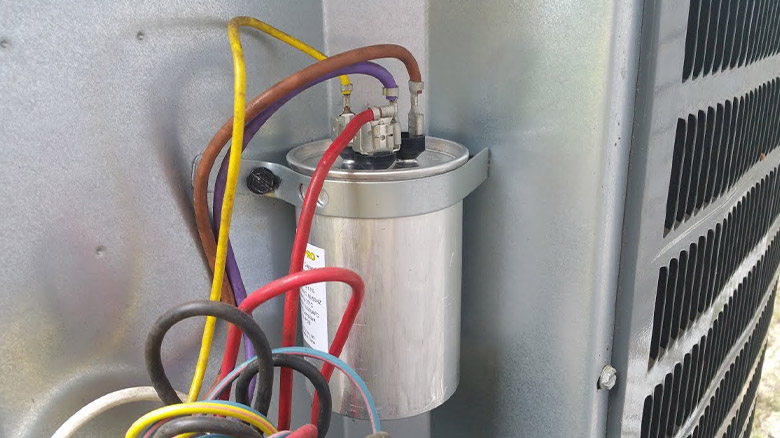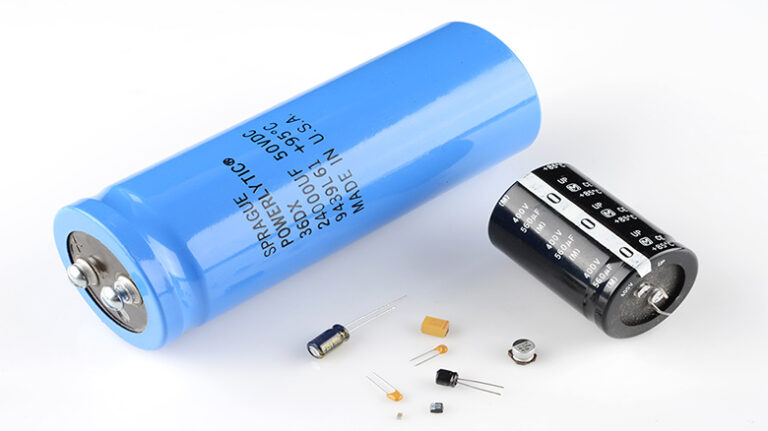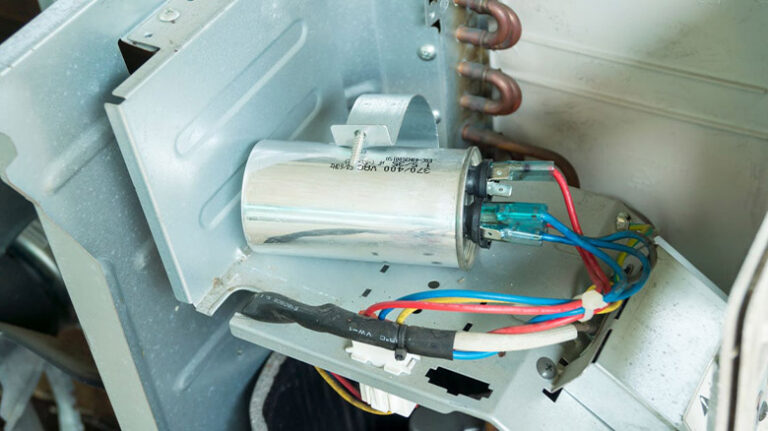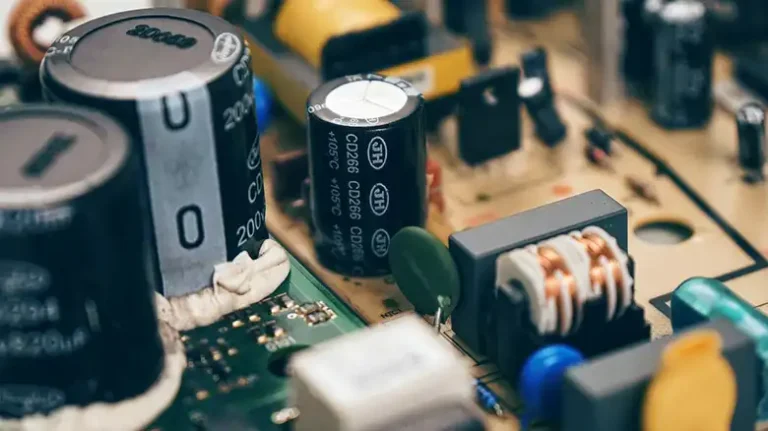AC Capacitor Keeps Blowing | Symptoms and Reasons
If your home is struck by lightning or experiences a power surge, the surge may be too much for your capacitors, causing them to blow. A short circuit can also lead to blowing. Overheating is another major issue. Eventually, the capacitor will overheat if it is not disengaged within a few seconds.

It may burn up if the compressor or fan motor drags due to damage or worn bearings. By leaving the capacitor in the circuit for too long, a faulty relay switch might cause it to overheat.
AC Capacitor Keeps Blowing – How Is It?
The components of an air conditioner are numerous. Knowing how everything works together will help you figure out which part is broken if your air conditioner isn’t working properly or at all. The capacitor is normally one of the hardest parts of an AC.
The capacitor is a tiny cylindrical component found inside the AC unit’s cabinet. It is in charge of providing electrical energy to the AC unit as well as storing electrical energy capable of jumpstarting the AC unit. This normally necessitates a voltage range of 400 to 600 volts.
Signs of a Faulty AC Capacitor
There are so many moving parts in a functional air conditioner that it might be tough to figure out which one is broken. Because an AC capacitor has a relatively lengthy lifespan, most heating, and air conditioning repair specialists will look at it last. With that in mind, there are a few indicators you may look for to see if the AC capacitor is to blame for your problems.
AC Unit Not Blowing Cool Air
With the summer months becoming increasingly hot, it’s no surprise that many homeowners are turning to their air conditioners for relief. Many malfunctioning parts could be present in an air conditioner that isn’t blowing cool air. If the fan and filter aren’t the issues, the electronic control board, thermistor, and AC capacitor should all be checked.
Electric Bills Are Increasing
The next symptom of a failing AC capacitor is somewhat odd. Many households are unaware that a malfunctioning AC capacitor could be to blame for an increase in the total cost of their energy bills.
If your AC capacitor fails or becomes damaged, your air conditioner will have to work much harder to keep up. This implies it will consume significantly more energy, which should be shown in your utility bills.
AC Unit Turns off on Its Own
Since the AC capacitor is in charge of powering the AC unit, if the capacitor fails, the AC unit will turn off on its own. This usually signifies that the capacitor is no longer supplying enough energy to the unit since it can no longer maintain enough charge to keep the unit running.
AC Doesn’t Turn On Right Away
As previously said, the AC unit is in charge of jumpstarting the AC unit by providing it with a powerful jolt. If your air conditioner doesn’t switch on immediately, it could indicate a damaged or failing AC capacitor. This means that your AC capacitor will require a lot more energy to complete the task.
AC Unit Won’t Turn On at All
This is essentially a continuation of the preceding reasons. Whether your air conditioner won’t turn on at all, have a heating and air conditioning repair specialist look at it to determine if the AC capacitor is to blame. The AC capacitor has usually failed fully in these cases and will need to be replaced. It’s beyond repair.
Hear a Strange Humming Sound
It’s a good idea to get acclimated to the sound of your air conditioner. If your air conditioner starts to make strange noises, you should contact a heating and air conditioning repair specialist right away.
If you hear a strange buzzing sound coming from inside your air conditioner, your AC capacitor may have begun to fail. It is working long hours and scrounging for money. That’s the strange buzzing sound you’re hearing.
Why Does My AC Capacitor Keep Going Out?
The capacitors perform admirably. They also go through a lot of wear and tear because their jobs are physically demanding. As a result, it’s fairly common for AC capacitors to fail before any other component. Here are some reasons given below.
Overheat
Since AC capacitors are particularly heat-sensitive, they are usually concealed deep within the AC unit. This part’s ability to store an electrical charge will be compromised by heat. The capacitor’s efficiency may suffer as a result of this. It could also cause the capacitor to fail in the worst-case situation.
When this happens, most heating and air conditioning repair specialists will advise you to replace the part with a new one. That is the best course of action available to you. It’s essential to remember that high temperatures not only limit the life of the AC capacitor but can also damage your AC unit as a whole.
As a result, it’s usually a good idea to keep your air conditioner in the shade if at all possible. It’s also why it’s vital to change your filters regularly. If you don’t, hot air might build up inside the air conditioner.
Wrong Voltage Rating
AC capacitors come in a variety of shapes and sizes. When completing any type of heating or air conditioning repair, ensure that the new capacitor’s specifications match the old one. Inexperienced technicians, as well as some individuals, may attempt to change the capacitors on their own.
This is not only hazardous, but it can also result in a malfunctioning capacitor. You’re expecting the capacitor to take on a much greater task than it can handle. An undersized capacitor may not necessarily harm or damage your AC unit.
But you’re expecting the capacitor to take on a much larger job than it can handle. As a result, their lifespan will be substantially shortened, and you’ll require another heating and cooling repair in no time.
Damaged Parts
The capacitor will overheat if it is not disengaged within a few seconds. A capacitor, A/C compressor, fan motor, or the unit’s wiring can all be damaged by lightning. Even a minor power surge might cause the capacitor to be damaged or destroyed, resulting in compressor overload and failure. A capacitor that is leaking oil is a dead giveaway that it is malfunctioning.
Electrical Overload
The capacitor in an air conditioner is designed to get the compressor and fan motors up to about 3/4 of their maximum speed before disengaging them. It isn’t made to handle a continuous electrical load. The capacitor will most likely charge over and be damaged if the motor becomes physically barred from turning or if the motor burns out.
Capacitor Getting Older
A capacitor, like everything else in life, has a shelf life. Most AC capacitors should last roughly 20 years in most cases. Because the capacitor has such a lengthy lifespan, most heating and air conditioning repair companies will examine it last. They anticipate that the capacitor will last for a long time.
However, some variables can cause a capacitor to wear out faster than others. If the AC unit cycles at a faster rate than usual, the capacitor will wear out much faster because it is doing a lot more work.
Conclusion
In field failures, the most common causes of a failed capacitor are overvoltage, exceeding the capacitor’s rated ripple current, insufficient cooling, structural problems from component manufacturing, and component ageing. It’s usually a combination of factors. If you see any sign of failure, it’s recommended to seek help from a professional for further do.

![Can I Use a 63V Capacitor Instead of 25V? [Technically Explained]](https://www.electronicstalk.org/wp-content/uploads/2023/07/Can-I-Use-a-63V-Capacitor-Instead-of-25V-768x431.webp)


![[Answered] What Is The Shelf Life Of Capacitors?](https://www.electronicstalk.org/wp-content/uploads/2023/12/What-Is-The-Shelf-Life-Of-Capacitors-768x431.webp)

